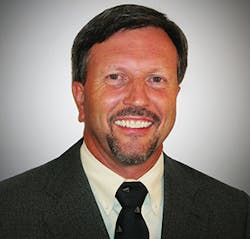Reader Profile: Bill O’Brien
The list of services performed by Bill O’Brien’s company, NextGen Engineering in California and Arizona, reads like an encyclopedia of erosion control techniques. O’Brien, P.E., CFM, QSD, is not only passionate about doing diversified work, but also about paying it forward in training the next generation of water resource practitioners, with the ripple effect extending globally. O’Brien and his staff provide civil engineering and design services for flood protection facilities, encompassing hydrology and hydraulic analysis, levee and embankment design, detention and retention analysis, water supply and sewer networks, grading and drainage plans, wastewater management, and scour depth analyses and riprap design for numerous site types using bioengineering methods to retain and enhance environmental features.
NextGen’s floodplain management, mapping, and hydraulic analysis entails staff evaluation and floodplain map changes in Conditional Letter of Map Revision, Letter of Map Revision, and Floodplain Elevation Certificates. The company sets up stream flow monitoring stations using US Geological Survey methods and equipment. Floodplain management services focus on floodplain and floodway mapping, National Flood Insurance Program and Federal Emergency Management Agency (FEMA) compliance, scour analyses, and mitigation plans. NextGen helps clients concerned about flood insurance requirements determine whether they have an Elevation Certificate, identify ways to lower insurance premiums, integrate flood mitigation when remodeling or rebuilding, elevate homes to lower flood risk and reduce insurance premiums, weigh options for adding flood vents to foundation walls or constructing breakaway walls, and coordinate community flood mitigation action with local officials. O’Brien and his staff work on watershed and water resource planning using land-use planning, watershed assessments, and watershed management plans based on data collection, writing reports, and implementing recommendations. The NextGen team has served as water master staff in adjudicated basins such as the San Gabriel River and Central Basin and participated in the Santa Maria groundwater rights court process. Watershed services encompass water budgets, stream flow analyses, enhanced recharge projects, regulatory permitting, low-impact development, compliance with construction general permits and water-quality total maximum daily loads, and manure and nutrient management plans.
What He Does Day to Day
“As the principal engineer, I have the technical responsibility to review designs, drawings, modeling, or reports to go from our offices to FEMA and county and city governments for review or approval,” says O’Brien, adding that he is assisted by members of his “lean” team. Once a week, O’Brien puts on his “teacher’s hat” to prepare engineers for the Fundamentals of Engineering (FE) exam, which draws people from throughout the world to his class in Tucson, AZ. The exam is the initial step in becoming a licensed professional engineer.
What Led Him to This Line of Work
One of the driving factors leading O’Brien to an erosion control career was earning the Soil and Water Conservation merit badge in the Boy Scouts, which requires scouts to define terminology and conduct hands-on exercises to develop conservation skills. Additionally, “my character was wired for math and science with a desire to see things built,” notes O’Brien. It is essentially in his family’s blood, he says: O’Brien’s uncle worked for the US Bureau of Reclamation, helping to design and build dams and irrigation projects in the United States and abroad. O’Brien earned a B.S. degree in civil engineering from Washington State University, where he found the professors to be inspiring. He went on to earn an M.S. degree in irrigation from the American University of Beirut, noting there were some “great professors and inspirational fellow students who had suffered to get the opportunity for training.”
What He Likes Best About His Work
There are three components of his work that O’Brien favors. One is helping clients get their projects approved in balance with floodplain and water resources. Another is helping communities domestically and abroad. “I enjoy being the floodplain advisor to cities and reviewing plans for projects in the floodplain,” says O’Brien, a Certified Floodplain Manager. He also enjoys helping engineers through training.
His Biggest Challenge
Keeping his business sustainable with the new Tucson branch, where the company has started the FE prep course, is his biggest challenge, says O’Brien. He’s brought in interns from the University of Arizona to help. “We also are marketing and following open doors,” he says.
